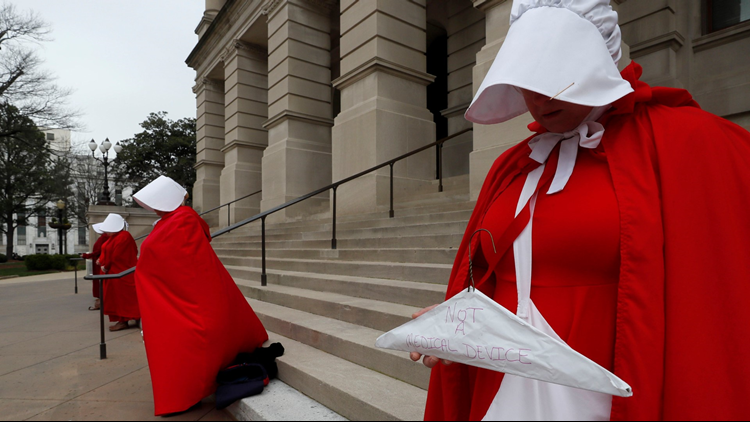LOUISVILLE, Ky. (AP) — Abortion-rights defenders opened a new legal fight against Kentucky on Friday to try to block one of the country's most restrictive abortion measures, which would mostly ban the procedure once a fetal heartbeat is detected.
Hours after Kentucky's Republican-dominated legislature passed the so-called fetal heartbeat bill, the American Civil Liberties Union was back in federal court in Louisville to challenge the measure. The legislation won final passage late Thursday and was sent to the state's anti-abortion governor, Republican Matt Bevin.
It was the second straight day the ACLU took aim at new abortion restrictions passed by Kentucky lawmakers.
ACLU attorney Brigitte Amiri said Kentucky is part of a broader agenda to push an abortion case to the U.S. Supreme Court to challenge the court's 1973 ruling that legalized abortion nationwide.
GOP-led legislatures in several other states are also considering fetal heartbeat bills amid surging optimism among conservatives that sweeping abortion bans might have a chance of prevailing in the reconfigured U.S. Supreme Court that includes President Donald Trump's appointees, Neil Gorsuch and Brett Kavanaugh.
"This onslaught of bans on abortion that fly in the face of Roe v. Wade are designed specifically for the purposes of trying to get the Supreme Court to reconsider Roe," Amiri said in a phone interview Friday.
The organization has filed four separate lawsuits challenging a series of abortion laws in Kentucky that mostly passed after the GOP took total control of the state legislature in 2017.
It's the most lawsuits the ACLU has pending against any state over abortion policy, Amiri said.
The most restrictive Kentucky measure would require anyone seeking an abortion to first determine if a fetal heartbeat is detectable. If it is, the abortion would be banned, with narrow exceptions such as when the mother's life is endangered. A fetal heartbeat can be detected as early as six weeks into pregnancy, before many women know they're pregnant.
Bevin's office did not immediately comment Friday on the ACLU's latest legal action or the bill's status now that it's been sent to the governor. The ACLU said in its lawsuit that it expects Bevin to sign it.
"I think we sent a strong message to the world that Kentucky is one of the most conservative, pro-life states in the country," state Senate Majority Floor Leader Damon Thayer said Thursday night.
ACLU attorneys said the heartbeat bill would prohibit 90 percent of abortions in Kentucky. The only abortion clinic in Kentucky, EMW Women's Surgical Center in Louisville, would have to turn away most patients, Amiri said.
"If the six-week ban takes effect, the consequences will be devastating," she said.
The ACLU added its legal challenge against the heartbeat bill to a lawsuit it filed Thursday against another Kentucky abortion measure sent to Bevin on Wednesday. That bill would ban abortion for women seeking to end their pregnancies because of the gender, race or disability of the fetus. When the ACLU said it would take the state to court again over that measure, Bevin defiantly tweeted: "Bring it! Kentucky will always fight for life."
It and the heartbeat bill would take effect immediately upon the governor's signature.
The ACLU, which brought the lawsuit on behalf EMW, is asking a federal judge to block both measures while its lawsuit challenging the bills is considered.
Federal judges struck down two Kentucky abortion laws in recent years, and the state has appealed both rulings.
One of those laws required abortion clinics to have signed agreements with a hospital and ambulance service in case of a medical emergency. Attorneys for the ACLU and others argued Bevin's administration was using the law to try to force the last abortion clinic to close. The other state law that was struck down required doctors to perform an ultrasound and attempt to describe it and show it to the patient prior to an abortion.
A trial was held late last year in a third lawsuit challenging a Kentucky law aimed at a common second-trimester procedure to end pregnancies. A federal judge has not yet ruled in the case.
Attorneys for the ACLU and other groups challenging the hospital and ambulance transfer agreement law are seeking $1.5 million from the state to cover attorneys' fees and other costs.
___
Associated Press Writer Adam Beam in Frankfort, Ky., contributed to this report.
What other people are reading right now:
- Man accused of impregnating teen after she asked him to
- Child dies after being struck by vehicle in Walmart parking lot
- Man wanted for murder after woman's body found behind dumpster
- 34 years later, police make arrest in cold case murder of Navy recruit
- ►Make it easy to keep up-to-date with more stories like this. Download the 10News app now.
Have a news tip? Email desk@wtsp.com, or visit our Facebook page or Twitter feed.



